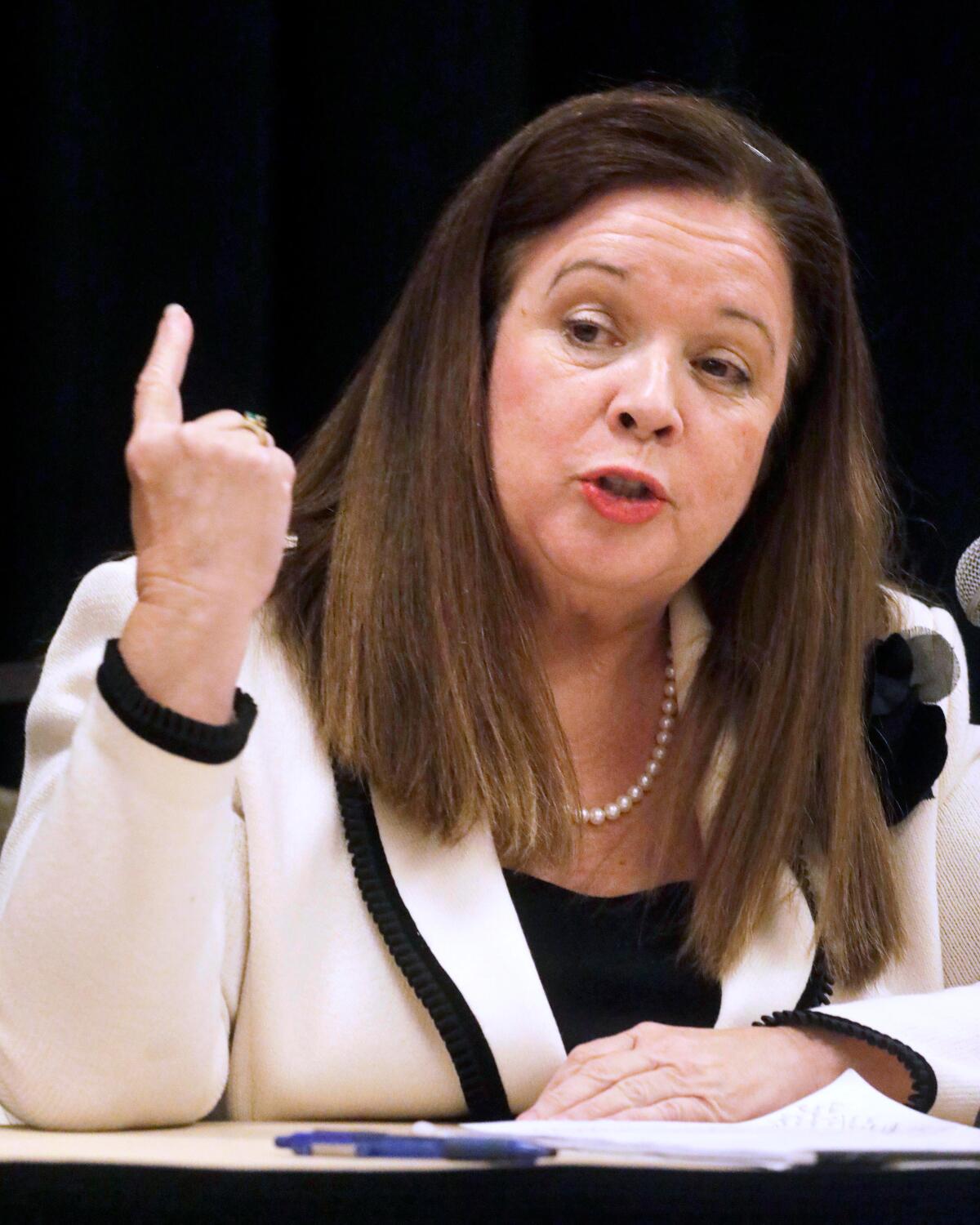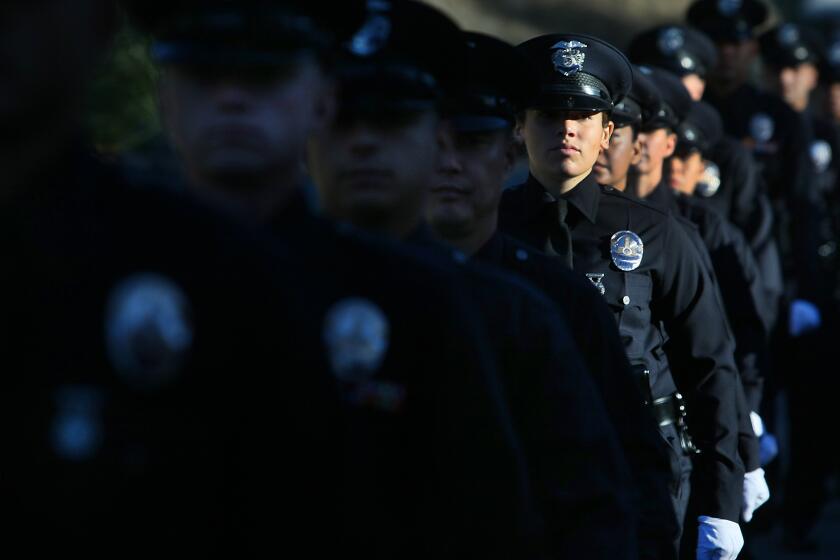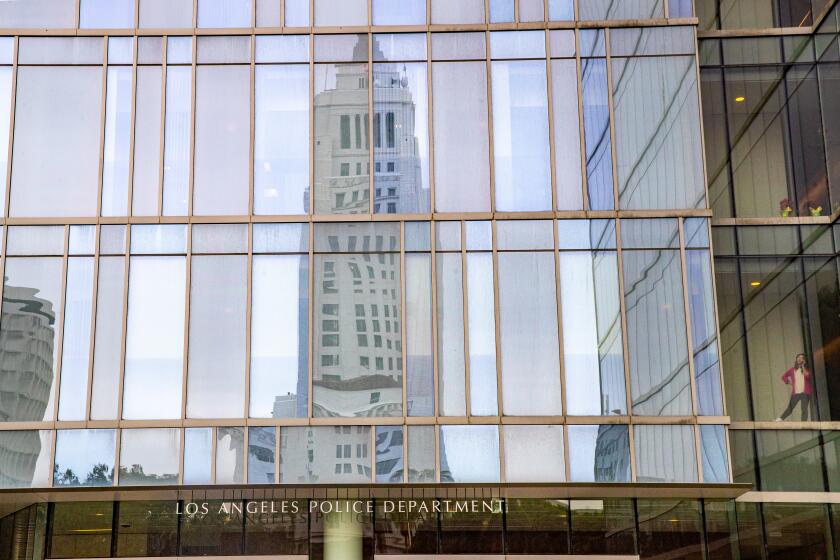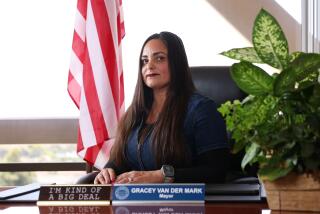After police photo release, L.A. city attorney tries to weaken public records law

- Share via
SACRAMENTO — Prompted by the release of information about thousands of Los Angeles police officers that activists posted to a public online database, City Atty. Hydee Feldstein Soto is trying to convince California lawmakers to weaken the state’s public records law.
While Feldstein Soto describes her proposal as a minor tweak to the California Public Records Act, civil rights advocates say it would severely diminish the power of the bedrock state law that allows access to information held by local governments and state agencies.
“That proposal would completely gut the Public Records Act,” Melanie Ochoa, an attorney who is the director of police practices for the American Civil Liberties Union of Southern California, said after reviewing a copy obtained by The Times.
“There would be really no transparency element of the PRA anymore if that were to become law.”
The watchdog group Stop LAPD Spying Coalition has created what it calls a “first-of-its-kind” website with the names and photos of every LAPD police officer.
The city attorney’s effort amounts to the latest volley in an ongoing tussle between city officials and community activists who have used the public records law to obtain information they see as helpful in holding police accountable for misconduct.
Feldstein Soto’s proposal — contained in a two-page document she has asked several state lawmakers to introduce as a bill — would allow government agencies to decline public records requests that seek “images or data that may personally identify an individual” whose information the agency collects, such as its employees.
California’s public records law already exempts from disclosure the home addresses and phone numbers of public employees as well as other information that could “constitute an unwarranted invasion of personal privacy.” So the change the city attorney is seeking could block the public from identifying government workers in their professional capacities.
While she framed her proposal as a necessity to protect a range of public-sector workers who could be subject to harassment — including sanitation employees who dismantle homeless encampments and public health workers who promote vaccinations — Feldstein Soto acknowledged that it was inspired by the public records request that led to the release this year of pictures and data of more than 9,300 L.A. police officers.
“I’m trying to address the wholesale doxxing of people that we need to depend on to do the business of government, without any reason other than the position that they happen to hold,” Feldstein Soto said.
“Having a tool in the toolbox of activists that is not aimed necessarily at the policy of the government, but aimed at intimidating the individuals who are carrying out the policy seems to me to be something where we could all come together to try to protect working people.”
Feldstein Soto traveled to Sacramento last month and said she met with two dozen lawmakers about her proposal. So far none have agreed to put it into a bill, but Feldstein Soto remains hopeful. Even though several lawmakers were skeptical of the idea, she said many more were “affirmatively enthusiastic and supportive.”
Lawmakers in Sacramento are halfway through the 2023 legislative session, which makes passing a newly introduced bill a big political lift. Legislation introduced at this point would go through an abbreviated review process, giving lawmakers less time to scrutinize the proposal and allowing limited public input.
Assembly Speaker Anthony Rendon (D-Lakewood) met with Feldstein Soto about her desire to change the public records law and “is sympathetic to the issue,” said Rendon spokesman John Casey. Rendon asked his staff to look for a way to get her proposal into a bill, Casey said, but so far that has not happened in the Assembly. In the state Senate, a spokesperson for Senate leader Toni Atkins (D-San Diego) said her staff met with Feldstein Soto about the proposal but that Atkins is not considering putting it in legislation.
In addition to allowing local governments to withhold photos and identifying information about their employees from the public, the bill Feldstein Soto drafted also would allow local governments to block the release of information that identifies people experiencing homelessness or receiving government benefits, as well as information on services provided to them. She said she’s aiming to shield people who are moved into housing or shelter from being sought out by pimps and drug dealers.
It would be “a discretionary exemption for purposes of basically preserving the safety of the folks,” she said. “We [could] redact the information that would allow somebody to target them.”
But it’s requests for information about L.A. police officers that have sparked the biggest dust-up over the power of the Public Records Act.
In March, a group called the Stop LAPD Spying Coalition launched a searchable online database with the names, photos, ethnicity, rank, date of hire, division/bureau and badge numbers of more than 9,300 officers, including what the city attorney described as a few hundred who work undercover or in other sensitive positions. The group encourages community members “to observe and document police abuses, especially arrests and other violence,” according to its website, and publishes a guide for activists on how to use public records laws to advance the goal of abolishing police.
Leaders of the Stop LAPD Spying Coalition previously told The Times that the information they published was obtained from the Los Angeles Police Department through a public records request. City officials say the undercover officers were inadvertently included in the response and are investigating how it happened.
In an attempt to claw back the photos of the undercover officers, the city sued the Knock LA journalist who filed the public records request and the Stop LAPD Spying Coalition. Last month, a Los Angeles judge rejected the city’s controversial request that he order the journalist to return a flash drive of police officers’ photographs. In his order, Judge Mitchell Beckloff wrote that the city had not provided evidence that the batch of released photos included undercover officers.
L.A. Superior Judge Mitchell Beckloff’s ruling was a clear win for Knock LA photo editor Ben Camacho and for the activist group Stop LAPD Spying Coalition
“They keep repeating this assertion that undercovers are in danger, yet they had all these opportunities to offer evidence of that and they’ve never done that,” said Shakeer Rahman, an attorney for the Stop LAPD Spying Coalition.
“Really, what they’re doing — and I think this legislative proposal just confirms it — is they’re trying to make the identity of every single police officer secret.”
Tom Saggau, a spokesman for the Los Angeles Police Protective League, said since the database went up several officers have faced threats and have reported them to the department, but he declined to provide details.
When Feldstein Soto approached the officers union about her idea to narrow the Public Records Act, Saggau said, “we conveyed to the city attorney that if a bill was introduced that prevented these types of doxxing disclosures that there was a high likelihood we would support it.”
The president of the union that represents Los Angeles social workers said that although it does not yet have a formal position on Feldstein Soto’s proposal, it sounds appealing as a potential tool to protect employees. Social workers who intervene when families are in crisis have faced threats of death and harm to their families, and had confidential information about themselves posted on social media, said David Green, president of SEIU Local 721.
“It’s an accident waiting to happen,” he said. “I’m a firm believer in transparency and accountability, but at the same time, I’ve had to represent workers ... [whose] health and safety and their life, sometimes, is really threatened by the people we serve, unfortunately.”
But civil rights attorneys refuted the notion that the public records law puts government employees in harm’s way. It does not allow disclosure of personal information, such as home addresses or family information, said Ochoa, the ACLU attorney — only work-related information.
“The courts have recognized that knowledge of who is working in the public and for the public is something the public has a right to know,” she said.
Ochoa pointed to the public records law as a critical tool in efforts to improve police practices and hold law enforcement agencies accountable because it can be used to identify specific officers. Without that power, she said, it would have been impossible to advocate for other transparency laws California passed in recent years to require more disclosure of internal records on police shootings and to create a system for decertifying officers for serious misconduct.
“That would not have been possible if we weren’t made aware that the same officer that killed someone had gone to another agency and killed someone else,” Ochoa said.
“We would oppose any attempt to gut the PRA in this way.”
More to Read
Sign up for Essential California
The most important California stories and recommendations in your inbox every morning.
You may occasionally receive promotional content from the Los Angeles Times.













